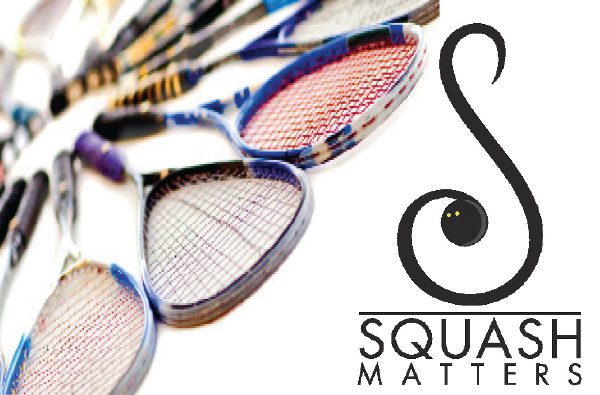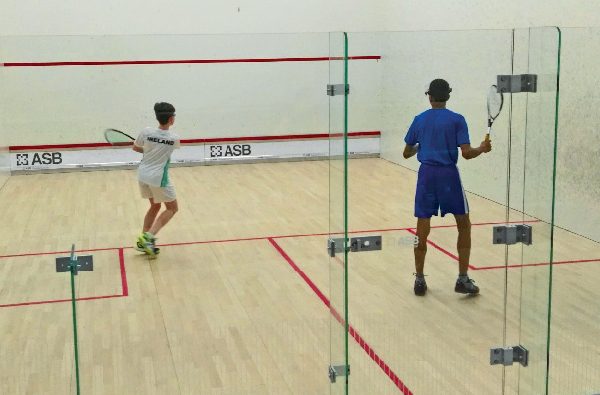By Mark Kelly



The benefits of joining SPORTSCO Squash Club, Mark Kelly enthuses, permeate body and mind, and extend beyond the four walls of a squash court to friendships, foreign lands and lifelong learning.
This piece will focus on what squash means to a very late starter; someone who had just relocated to the west coast of Canada at 35 years of age in 2008 and was keen to develop a social circle whilst replenishing his body and mind.
I started playing squash socially and competitively in Vancouver, British Columbia. My two years as a Vancouver resident inspired me to establish the Irish Sports and Education Association (ISEA) upon my eventual return to Ireland in 2012. ISEA’s flagship programme, Squash Link (www.squashlink.org), has been operating out of SPORTSCO, South Lotts Road, Ringsend, Dublin 4 since November 2015.
Any sport can be social, but why is squash any different? What does it offer that other games fail to deliver? To begin with, it is played in 175 countries by an estimated 20 million people on approximately 50,000 courts; it is therefore a sport that travels extremely well.
The potential value of squash to any individual who commits to it is vast. Given there are no age, size or physical strength limitations, it is a lifelong sport.
The speed, endurance and intensity of effort involved in squash reward those who apply themselves conscientiously and over a long period. As an all-weather sport that sees marvellous and mysterious minds converge, squash represents a uniquely character-building challenge. Like all sport, application, determination and the ability to think under pressure are vital requirements, but if you are hungry and ambitious to succeed and adopt a common-sense approach, the standard at which you play and your level of enjoyment will soar.
The squash court places physical demands on our bodies, but far less amenable to analysis, and in so many ways far more interesting, is the potential of our minds to excel in this primitive pit of passion and perseverance – a place where two players, shut up like caged animals, battle it out with one another.
Of course, we are all inherently competitive. This is not to suggest that such instincts manifest in the same way; it is very clear that gladiatorial battles demonstrate quite the opposite, no matter the sport. Nor does it suggest that ‘competitive’ cannot be deconstructed into multiple layers of meaning.
Healthy approaches to competition can be worlds apart, and naturally so. The great advantage of squash as a social sport is that the game is very much the focus and winning then becomes a vital ingredient, but not its essence; the ultimate reward, when a healthy approach is adopted, is one that serves therapeutic ends – mental, physical as well as spiritual / meditative.
Often referred to as the healthiest sport on the planet, its allure is largely down to the abundant rush of endorphins and the guarantee of a great workout when competing and practising either with others or on one’s own (highly recommended as one of many pathways to rapid improvement) in as little as 30 minutes!

Squash reduces the risk of death by 47%!
According to a recent, World Squash Federation newsletter:
‘Playing squash, tennis and badminton is the best way to reduce the risk of suddenly dying, a study has found. The racket sports reduce the risk of death by 47% compared to doing nothing, researchers discovered.
The study, which looked at the impact of different sports on the health of people with an average age of 51, found swimming cut the risk of death by 28%, aerobics by 27% and cycling by 15%. Interestingly, it discovered that taking part in running and jogging, or football and rugby did not have a significant effect on cutting the chance of death.
The study was based on 11 annual health surveys for England and Scotland from between 1994 and 2008. Senior author Associate Professor Emmanuel Stamatakis at the University of Sydney said: “Our findings indicate that it’s not only how much and how often, but also what type of exercise you do that seems to make the difference.” He added: “We found robust associations between participation in certain types of sport and exercise and mortality, indicating substantial reductions in all-cause and CVD mortality for swimming, racquet sports and aerobics and in all-cause mortality for cycling.”
The study, in the British Journal of Sports Medicine, aimed to quantify the impact of six different sports on the odds of beating death. It examined 80,306 adults over 30 who were questioned on how much exercise they had had in the preceding four weeks, and if had been enough to make them ‘breathless and sweaty’. Participants were tracked for an average of nine years, in which time 8,790 died from all causes and 1,909 from heart disease or stroke’.
Squash skills
Developing squash skills has been likened to learning the violin: success depends on developing muscle memory and perfecting technique by practising over and over. However, unlike playing the violin, the beauty of squash is the instant gratification it provides. The game is essentially played in a room, on a wooden floor, in a four-wall space, where you are permitted to hit a rubber ball off any of the walls, or combination of walls, provided it also hits the front wall. Combined with a range of balls to accommodate all abilities and levels, squash is therefore a racket sport with a large margin for error – invaluable when introducing a new physical activity to beginners.
Whatever your standard or experience, every player has to continually commit to a range of gyrations and pivotal movements, with changes of direction; the mental necessity of assessing what is going on and a wide range of other factors come together to provide a mind-spelling and intensely efficient workout.
Character-moulding
Many consider the enormous enjoyment derived directly from playing the game is typically only ever exceeded at the moment of victory, but, just as importantly, squash offers a uniquely challenging opportunity for lifelong learning and engagement. As expressed by Jonah Barrington, perhaps the most successful exponent of this magical, spell-binding pastime in the history of the game:
“Squash is not just a game. For anyone who has the opportunity to become involved with squash, it builds independence. As with any sport approached properly and with concentration, one has to be independent in that area because it’s ruthless… you have to stand on your own two feet entirely… basically it’s the individual down there in the pit who has to promote himself or herself, and persevere, and learn all kinds of little things that are character building.”
The coup de grace
Squash can be played your whole life. It is a lifelong social sport, attracting players of all ages at different stages of their lives. Barrington, a former Trinity College student, unparalleled leader and founding father of the modern game, for example, didn’t pick up a racket, with the intention of excelling competitively, until he was 23! Squash represents a spring of inter-generational promise, offering a great deal to posterity, not least as a social sport with serious hobby potential. Squash inheres within friendships and friendships inhere within squash. Respect and friendship, fun and fitness will always make squash the game it is.
Squash Matters
Kelly’s passion for the sport and its potential as a force for enrichment, health and well-being has led to his decision to develop a new Squash Matters initiative at SPORTSCO. Whilst planning is ongoing, suffice it to say that anyone interested in taking up the sport or developing their game will be welcomed with open arms.
All Squash Matters coaches share a simple philosophy: to assist and develop players of all ages, children and adults, by embracing sport as an opportunity for lifelong learning, fun and social engagement. They are also inspired by a World Squash Federation process of open skills development rooted in a PDA (Perception, Decision, Action) diagnostic cycle. Whilst a closed skill might be considered to consist of striking the ball such as hitting a ground stroke, volley, boast (where the ball hits the side or back wall before contacting the front wall) or playing any shot for that matter, a focus on open skills embraces the full range of movements, perception and anticipation in relation to each stroke.
One fundamental principle is that a squash player’s movement should be relaxed, fluid and rhythmic, starting with the correct racket preparation, including the grip, as well as movement of feet into the optimal hitting position. When a rally is underway, a squash player should never be entirely still. This means they will typically be on the balls of their feet rather than flat-footed on their heels, letting their arm/racket (reach) complement the efforts of body movements/exertions. The time for resting, being flat-footed and breathing mindfully is when the point is over and you are waiting to serve or receive.
Balance and stability, especially when striking the ball, are essential in this fast and intense sport, not least to ensure the risk of injury is minimal. Parallels with dancing and boxing, albeit with a racket in hand, spring to mind when imagining the potential benefits of this sporting discipline and as recently declared by one of the modern game’s most notable commentators, Paul Johnson, ‘Chess on legs’ is a description that any aficionado of the game would wholeheartedly endorse.
Evidently, core strength, in every manifestation, is an essential component of anyone wanting to commit to a challenging individual sport. SPORTSCO offers a wide range of activities which include pilates, yoga and a myriad of other disciplines for improving physical and mental wellbeing. This outstanding facility is an ideal bedfellow for programmes such as Squash Link and Squash Matters.
We know all too well of the physical time bomb in Ireland and beyond, where the threatened cost to public health is in the billions for the next generation. Maintaining a level of activity is therefore of sacrosanct importance for society as a whole.
Sport enhances people’s resilience. Knowing we can look a challenge in the eye, from as early on in life as possible, equips us with the confidence in our ability to overcome obstacles in the wider world.
This article is dedicated to Brian Kelly, my father: a brave, daring, loving, giant of a man, and his cherished memory.
For further details, Email: squashmatters@gmail.com.



